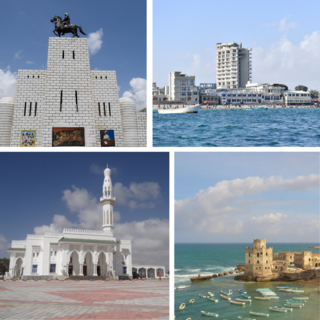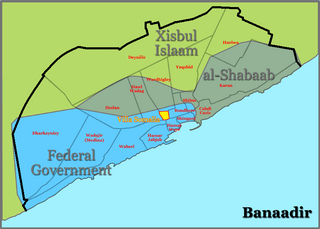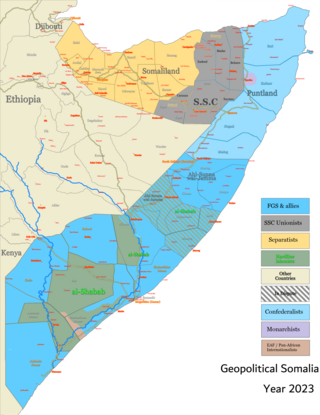
Mogadishu, locally known as Xamar or Hamar, is the capital and most populous city of Somalia. The city has served as an important port connecting traders across the Indian Ocean for millennia and has an estimated urban population of 2,610,483.

Banaadir is an administrative region (gobol) in southeastern Somalia. It covers the same area as the city of Mogadishu, which serves as the capital. It is the only region in the country not belonging to any of the six states. It is bordered to the northwest by the Shabelle river, and to the southeast by the Indian Ocean. Although by far the smallest administrative region in Somalia, it has the largest population, estimated at 1,650,227 in 2014.

Ali Mohammed Gedi, popularly known as Ali Gedi, is a Somali politician who was the Prime Minister of the Transitional Federal Government (TFG) of Somalia from 2004 to 2007. He was relatively unknown in political circles upon his appointment as prime minister in November 2004. He is affiliated with the Abgaal subclan of Mogadishu's Hawiye clan, one of Somalia's four most powerful clan 'families'. He narrowly survived a suicide attack at his home that left at least seven people dead on June 3, 2007. Gedi was widely viewed as corrupt, and was replaced by Nur Hassan Hussein as PM during late 2007.

The Somali Warlord Alliance, officially called the Alliance for the Restoration of Peace and Counter-Terrorism, was a Somali alliance created by various Somali warlords and businessmen with the backing of the American Central Intelligence Agency in order to challenge the emerging influence of the Islamic Courts Union during the Somali Civil War.
Muse Sudi Yalahow born Mogadishu was a Trade Minister in the Transitional Government of Ali Mohammed Ghedi. He was dismissed in June 2006 after ignoring government requests to halt fighting with the Islamic Courts Union militia.
Mohamed Botan was a Somali rebel leader, formerly based in Mogadishu, and a former member of the Somali Transitional Government, in which he was minister for the disarmament of militias. He was also a member of the Alliance for the Restoration of Peace and Counter-Terrorism (ARPCT), a group of warlords opposed to the Islamic Court Union and allegedly financed by the United States.

The Murusade, also contemporarily known as Mursal, are a Somali subclan, part of the Karanle branch of the larger Hawiye Clan. They primarily reside in the central regions of Somalia, particularly in the Galgaduud, Lower Shabelle, Middle Shabelle and Banadir regions.
Mohamed Qanyare Afrah (Somali: Maxamed Qanyare Afrax, Arabic: محمد افراح قنياري} was a Somali faction leader and politician who was based south of Mogadishu in the Daynile District. He came in third position in Somalia's first election as a federal country on 10 October 2004 and was subsequently appointed minister of public security in the government of Prime Minister Ali Mohammed Ghedi, He served as minister of security in 2006 but was dismissed after ignoring calls by the Prime Minister Ali Mohammed Ghedi to stop fighting forces of the Islamist Courts. He continued to participate actively in Somali political affairs being reelected to the first post transitional federal parliament of Somalia as a member of parliament, he resigned from his seat representing his clan in the summer of 2013, his seat in the Federal Parliament of Somalia was taken over by his son Cabdiweli Mohamed Qanyare.
After two decades of violence and civil war and after the Transitional Federal Government (TFG) of Somalia captured Mogadishu and Kismayo, the TFG attempted to disarm the militias of the country in late 2006. According to the UN/World Bank's Joint Needs Assessment (JNA) coordination secretariat, "the total estimated number of militias [militia members] to be demobilized is 53,000." In 2005, they estimated that "there are 11–15,000 militia people controlling Mogadishu ."

The Bakaaraha Market is an open market in Mogadishu, Somalia. It is the largest in the nation. The name Bakaaraha is derived from the Somali word for grain silo or storage, baqaar.
Over the course of the Somali Civil War, there have been many revolutionary movements and militia groups run by competing rebel leaders which have held de facto control over vast areas within Somalia.
The timeline of events in the War in Somalia during 2006 is set out below.

The timeline of events in the War in Somalia during 2007 is set out below.

Jeremy Scahill is an American activist, author, and investigative journalist. He is a founding editor of the online news publication The Intercept and author of Blackwater: The Rise of the World's Most Powerful Mercenary Army (2007), which won the George Polk Book Award. His book Dirty Wars: The World Is a Battlefield (2013) was adapted into a documentary film which premiered at the Sundance Film Festival and was nominated for the 2014 Academy Award for Best Documentary Feature. In July 2024, he left The Intercept and, together with Ryan Grim and Nausicaa Renner, founded Drop Site News.
Since the 1960s the United States Central Intelligence Agency (CIA) has engaged in a variety of covert activities in the east African country of Somalia. These activities have included financing pro-Western Somali political parties, funding warlords, extraordinary renditions and most recently operating black sites. Somali government officials have reported that American agents operate unilaterally inside the country.

The Battle of South Mogadishu occurred in the Somali capital of Mogadishu on February 24, 2009.

The Battle of Mogadishu (2010–11) began on 23 August 2010 when al-Shabaab insurgents began attacking government and African Union Mission to Somalia (AMISOM) positions in the Somali capital of Mogadishu. Al-Shabaab began its offensive after its spokesman said the group was declaring a "massive war" on troops sent by AMISOM, describing its 6,000 peacekeepers as "invaders". In December 2010 the number of AMISOM troops was increased to 8,000 and later to 9,000. The battle's name usually includes the years, when referenced, in order to distinguish it amongst the nine major Battles of Mogadishu during the decades long Somali Civil War.

This is a 2011 timeline of events in the Somali Civil War (2009–present).

This is a 2018 timeline of events in the Somali Civil War (2009–present).

This is a 2024 timeline of events in the Somali Civil War (2009–present).













